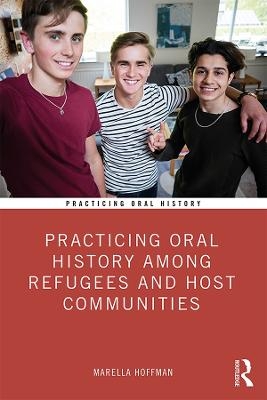
Practicing Oral History Among Refugees and Host Communities
Routledge (Verlag)
978-1-138-54131-3 (ISBN)
Practicing Oral History among Refugees and Host Communities provides a comprehensive and practical guide to applied oral history with refugees, teaching the reader how to use applied, contemporary oral history to help provide solutions to the ‘mega-problem’ that is the worldwide refugee crisis.
The book surveys the history of the practice and explains its successful applications in fields from journalism, law and psychiatry to technology, the prevention of terrorism and the design of public services. It defines applied oral history with refugees as a field, teaching rigorous, accessible methodologies for doing it, as well as outlining the importance of doing the same work with host communities. The book examines important legal and ethical parameters around this complex, sensitive field, and highlights the cost-effective, sustainable benefits that are being drawn from this work at all levels. It outlines the sociopolitical and theoretical frameworks around such oral histories, and the benefits for practitioners’ future careers. Both in scope and approach, it thoroughly equips readers for doing their own oral history projects with refugees or host communities, wherever they are.
Using innovative case studies from seven continents and from the author’s own work, this manual is the ideal guide for oral historians and those working with refugees or host communities.
Marella Hoffman is a Fellow of the Royal Anthropological Institute and has held positions at Cambridge University as well as at universities in France, Switzerland and Ireland. A former chief editor of a public policy magazine, her projects with communities have been taught as positive practice by government. Her other books include Practicing Oral History to Improve Public Policies and Programs (2018), Asylum under Dreaming Spires: Refugees’ Lives in Cambridge Today (2017), and Savoir-Faire of the Elders: Green Knowledge in the French Mediterranean Hills (2016). She runs a Writers’ Retreat Centre in southern France; visit www.marellahoffman.com.
Part I – What is being done around the world 1. How oral history can improve outcomes for refugees and host communities 2. The importance of listening to host communities 3. The tradition of oral history with refugees, and how it’s radically changing 4. Case studies of oral histories with refugees: Transforming lives and outcomes 5. Case studies of oral histories with host communities: Letting discontent be heard Part II – Doing your own oral histories to improve outcomes for refugees or host communities – The step by step guide 6. The ethics, risks and legalities of doing oral history with refugees or host communities 7. Strategically planning an oral history project that will improve outcomes for refugees or host communities. 8. Doing interviews that will make a difference 9. Editing and publicizing narrators’ interviews in ways that help improve outcomes for communities 10. Soaring refugee numbers, a twenty-first century ‘mega-problem’: Applied oral history skills as part of the solution Appendices Glossary – some key concepts used in this book
| Erscheinungsdatum | 05.12.2019 |
|---|---|
| Reihe/Serie | Practicing Oral History |
| Zusatzinfo | 28 Tables, black and white; 11 Line drawings, black and white |
| Verlagsort | London |
| Sprache | englisch |
| Maße | 156 x 234 mm |
| Gewicht | 372 g |
| Themenwelt | Geschichte ► Allgemeine Geschichte ► Neuzeit (bis 1918) |
| Geisteswissenschaften ► Geschichte ► Geschichtstheorie / Historik | |
| ISBN-10 | 1-138-54131-1 / 1138541311 |
| ISBN-13 | 978-1-138-54131-3 / 9781138541313 |
| Zustand | Neuware |
| Haben Sie eine Frage zum Produkt? |
aus dem Bereich


